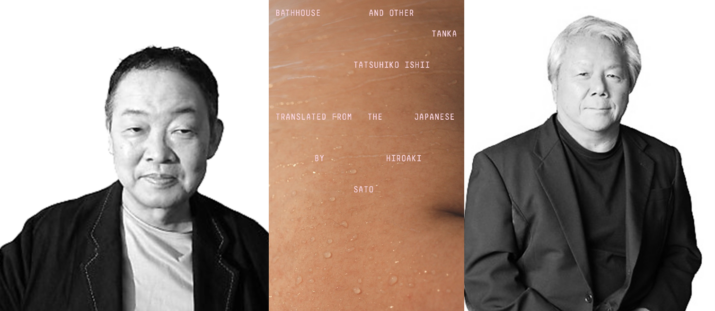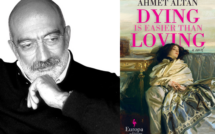

This is part of our special feature, Thinking Eurasia Now.
Translated from the Japanese by Hiroaki Sato.
Orestes in His Old Age
ὦ τέκνον τέκνον,
οἴκτιρε τὴν τεκοῦσαν
—Sophokles, Elektra
Rappelons-nous que chez les Anciens il n’était pas d’autel plus sacré, entouré d’une vénération, d’une superstition plus profondes, gage de plus de grandeur et de gloire pour la terre qui les possédait et les avait chèrement disputés, que le tombeau d’Œdipe à Colone et que le tombeau d’Oreste à Sparte, cet Oreste que les Furies avaient poursuivi jusqu’aux pieds d’Apollon même et d’Athênê en disant : «Nous chassons loin des autels le fils parricide.»
—Marcel Proust, final paragraph of “Sentiments filiaux d’un parricide,” deleted against the author’s will by the editorial department of Le Figaro at the time of its first appearance
Appearing to enjoy having nothing to do by his warm hearthside. . . .
but, the King
has a heart he’s unable to clear up. Both the hero in his youth (and
the great ruler now)
a continuation of sleepless nights and restless days. . . . Such was his life!
The smell of blood of the past, rises. So does from the cup of wine
I quaff this evening again
Those days it rained all the time, it, seems. . . . when I passed my
voice-changing period
Everyone wanders. Even if the one who’d grown up in a blessed
household, the boy. . . .
That’s the way it is, besides. . . . Domestic violence, yes, you see!
Cruelty, yes, you see!
The puberty that hardly grows. Especially if the mama was the (in
truth) enemy. . . .
It isn’t that a battlefield is not limited to a hill where shells fall
(yeah!) I’m saying
He must kill! somebody. . . . on the very border where the boy turns
from puberty to youth
Either to kill mother in the twilight (or, to kill father in the broad
daylight) . . . if there’s no other way
Even if you became blind that’d be too late! The king slaughterer
also killed his sleep I hear
The remaining scent of a daybreak dream. Embraced by mother of
the past and groaning
—the rest is silence. So mumbled the prince, his mother, her death,
as it was
A dream of a sinking ship. . . . Waking from a dream Agrippina
becoming violently furious
Until I was called a young man I had yearned for being one dreaming about being one. . . .
As for mother you see, it’s a child’s wish to meet her again. If it
weren’t a wish, to kill her too
The legends of mothers killed by their dearest children. Even if the
sea calms in the twilight. . . .
Wiping the rim of the wine cup with my thumb, I then ask [the
true meaning of a human’s life]
Whoever it may be every child is a parricide! As long as it has dived
through the birth canal (bloodied). . . .
Revere the mothers whose delivery scraped their lives off or made
them lose their lives, children!
So many months and years since then. . . . In the port how many
times did the ship burn?
Powerless as years accumulate. . . . even the color of the ocean seems
as if ink has been poured into it
Although acting cheerfully he’s lost his own flower and his flower
seen by others, meaninglessly. . . .
Growing old is more painful than death. Furthermore, if everyone
were a parricide. . . .
Illusion of the human world, that too. . . . The exploit in your prime,
that, yes! The reputation, that, yes!
Just about the time lights turn on in the houses the King must grow
old all alone
Even the moon from the sea is dark. When yet another friend has
preceded you pronto
Probably it isn’t too late, I tell you. He unties the rope and quickly
(look!) a wind rises
What stars! Just because an old decrepit parricide has rowed out in
the sea all by himself
The gladness of aiming for the island when old. . . . The island where
(that!) dear fair-skinned aunt resides
I don’t mind someone singing of us. Whisperingly that, the sea
has closed over them
For the punishment for killing his mother once upon a time he dies
much older than she. Tell them, that
I’d stay in mother’s womb! Though going by boat pains my old
body and the world is dark
One hundred generations of human life are just one night. Out of
the gray haven, to the blessed island—
About the Glove, and the Pockets
In a blank space of the photo album: Le monde de Proust vu par Paul Nadar
A single photograph. A single portrait photograph that Nadar, not the
famous one but his son Paul Nadar, took on February 25, 1896. Frozen
there is a pair of lovers. Seated on the right side as you face it is a plump
middle-aged woman wearing loosely made checkered street clothes for
the afternoon, hair done up at the top. Faintly smiling, she places her
hands on her lap, only her left hand in a kid glove.
Pure love? If we could remain smiling like this only for eternity!
The memory of the tryst to be left (Life is like a maze you know)
Just a minute ago I think I heard again. . . . (that) beating of the
wings of (cruel) time
It has begun, see, already. The evening twilight for the lovers sobbing rose color
In my left hand <love>! Let us leave it in the glove until it grows
dark
Standing next to the woman is a smallish man beginning to show his
age but endowed with a splendid moustache and beard. A large bowtie
tied around his standup collar, he shows a bit of a pocket watch where
the lapels of his jacket meet. You can’t see his left hand that is placed
behind him, but you can also see only half of his right thumb, either, as
he casually puts his hand in his jacket pocket.
Has it reached you? (My letter added to) the fan made of cherry-
colored Japanese paper
This hesitation to call you an imprisoned woman. See, I’m the one
caught
In evening dusk so beautiful (as to make you sad). . . . Those eyes of
yours (looking into the distance)
A kiss with eyes, something so called exists (in this real world). . . .
Now is eternal now. <Love> hidden from the camera and put in a
pocket
The woman is a famous demimondaine. Rumor has it that she received
an allowance of 10,000 francs every month from the wealthy American
dentist Dr. Thomas Wiltberger Evans who kept her. Needless to say, the
number of men who courted her was countless. In the salons she held in
her gorgeous villa innumerable gentlemen and artists, including many of
her lovers, gathered. This high-class courtesan of whom Manet painted
some portraits, and whom Proust is said to have used as one of his models
of Odette de Crécy, was a large, gorgeous flower that bloomed in the
demimonde of Paris. And her name? Yes, she was called Méry Laurent.
Days when I sobbed quietly, no, I had no such days! Even when I
decked myself with white camellias
The many love songs I hummed for many a <someone>. Yes, from
flower to flower. . . .
Is it a flame of lust? That which we cannot pacify with words
The yearning to live in a corner of a life. Of the life of <someone>
If I am to flow away let me always smile. Hiding <love> deeply
The man is one of Méry Laurent’s lovers. A middle-school English
teacher until several years ago, he seems to be living on an annual pen-
sion of just about 2,500 francs. Gathering poets and artists in his home
to talk and argue every Tuesday is one of his few luxuries. Yes, he is a
poet. The twentieth century to come will no doubt begin with this
man’s poetry, with the whole world expressing the highest respects to
him. He is none other than Stéphane Mallarmé.
Our twilight (in the wind you create with your fan) burns quietly. . . .
Do you not feel it? You! The fountain nymphs inhabit without
even wearing chiffon
The kingdom starts here. I once wrote in a poem Je tiens la reine!
I will (suddenly rise and ) dedicate this salutation. Yes, the words
that fly about
And those words in my pocket. . . . (along with your right glove. . . .)
Teacher’s Teacher : Il Miglior Fabbro
A letter (to be read aloud)
From the distant edge of the Orient I, an immature poet, salute you—
you, who sleep a gruntled sleep in the shadows of cypresses on an isle in
the offing where those alive cannot live, you, the lord of a tomb dyed in
gloomy evening glow and silence. Blacksmith far superior to anyone
else, s your anger against the world faded yet?
To the teacher’s teacher! To the teachers’ teacher, my first letter. . . .
Myself a versifier in a forme fixe! Come to think of it, ain’t I behind
the times after all?
I think of. . . . Yeah right, of, the (insoluble!) fury of the poet far
ahead of the times (you!)
The green of the cypresses being so dark. . . . The island of death, is,
that, the island of poets?
The noble (poet’s) fury. Just when the evening glow enwraps the
world in darkness
You were the maestro of all modern poets, the father of the entire
twentieth-century literature. The song of the drowned Phoenician
shone better by your relentless editing, the style of the novelist with a
special-large Martini glass was corrected by you. It was also you who
redoubled the fame of an old poet of the wild swans and an ancient
tower, and it was you who allowed a Jew with soap in his hip pocket to
leave a brothel in a city at the mouth of a river for the world.
The cruelest month, writing, something like that too, may well be,
in fact something barbaric
Throwing lilies as they are in bud in the strait of civilizations, that
of sort of thing
Thou shan’t miss the songs of the beautiful Sirens either, they say. .
. . . If you are a poet
The ocean all at once darkens (the only one (in the world) without
wax put in his ears)
Arrogant one, be struck by thunder! Whether you are a genuine
poet or a hegemon
But when it comes to you! No luck! Thrown in an exposed cage, con-
fined to a psychiatric hospital. . . . The ingrate world was too cold to
you. In the end you were expelled from your fertile motherland, the
citadel of Capitalism, and died as an exile in the city sinking in black
stagnant water. Like the poet who died by the Black Sea two thousand
years ago. . . . Worse, with almost no one understanding him. . . .
Guard dogs only bark! At the tower crumbling though of a shallow
history
In the window of the bedroom awaiting the hero of pilgrimage an
blue parrot, and, the, moon. . . .
Evacuate, from the accusation. The accusation, that you are a
deranged Fascist poet
Thousands of poetic lines that vanished in the waves of remorse
(and, the unrecoverable, time)
Thou shan’t laugh! At the mad old man’s catch that is too gigantic
You are right in your anger. If possible, leave it as is, do not suppress
your anger please. Because your eternal fury seems to embolden
the poets following you. . . .
You should fade away as an old man with green hair. . . . Pity, the
poet ain’t an immortal
That’s what happens, see? At the time, there were a number of
poetry collections that were, stillbirths
His crowing was done by Beatrice’s hands. . . . After the poet’s death
The teacher’s teacher’s poetry will (yes!) never fade from memory
Postscript says: I will pay respects, someday. To your grave on
the isle in the evening glow
Sailing into the Landscape
To Claude Lorrain
That is no country for old men.
—W. B. Yeats, Sailing to Byzantium
Sinking world! Or is it the evening (of birds) that goes on falling
soundlessly?
In the harbor numerous ships. . . . All ships stay at anchor with
memories of storms
We who are not immortals. At the end of this (tear-soaked) summer, come, let us set sail
At stern at bow (Friend who killed himself !) take up a lyre that
doesn’t sound even if you play, sing voicelessly
To me, the one endowed with no wings (indeed) flesh is a heavy
robe, wouldn’t you say?
In a country where souls sing (a country in twilight!) am I to meet
my mother once again?
I would learn the song (Behold! The evening sky is unfathomably
clear and quiet besides)
Led by dolphins the color of evening glow I cross the sea. Noise-
lessly, I cross, the seas. . . .
“Ovidius, died on the Black Sea ” the news, at long last, arrives.
After darkness has completely settled
The Handsome Sailor has sunk in the maelstrom. Just like a lily
that remained in bud
The sails all burned by the stars. . . . (To tell the truth!) heroes never
make it back home
The nightmare that utters no voice! Nay, they say. Something called
eternity, makes no sound
Has the body perished? None of my (with a torch raised) shadow
on the quarterdeck
Destined to stop a beer barrel the Great King’s flesh. My flesh I
shall throw into the sea
Having set sail, one night is a hundred generations—.
Gilded morning awakes, at the end of the sea
I’d stay in mother’s womb!
Though setting sailing again is painful
and the world is dark
Tatsuhiko Ishii, poet and essayist, was born in Yokohama, Japan in 1952. For much of his life, he worked as a journalist for one of Japan’s largest newspapers and book publishers, The Asahi Shimbun, covering cultural affairs locally and abroad, while also working for their editorial, advertising, and production departments. At age twenty he won the New Poets Prize in Japan, and in 1997 he received an Asian Cultural Council grant to spend several months in the United States to research gay culture. Ishii has published a dozen collections of tanka since 1982, one edition of which appeared in France in 2012.
Hiroaki Sato is a translator of poetry and prose, classical and modern, who has won a PEN Translation Prize and two Japanese-U.S. Friendship Commission translation prizes. His nonfiction book On Haiku (“a treasure”—Books on Asia) and his translation of Sakutaro Hagiwara’s The Iceland are both published by New Directions. Sato is “perhaps the finest translator of Japanese poetry into American English” (Gary Snyder).
“ORESTES IN HIS OLD AGE,” “ABOUT THE GLOVE, AND THE POCKETS,” “TEACHER’S TEACHER : IL MIGLIOR FABBRO,” and “SAILING INTO THE LANDSCAPE” from BATHHOUSE AND OTHER TANKA, copyright © 1994, 2001, 2003, 2004, 2007, 2011, 2020, 2023 by Tatsuhiko Ishii. Translation copyright © 2023 by Hiroaki Sato. Used with permission from New Directions Publishing Corp.
Photo of Tatsuhiko Ishii courtesy of the author; photo of Hiroaki Sato by Tsuneko Kanehako.
Published on September 12, 2023.




